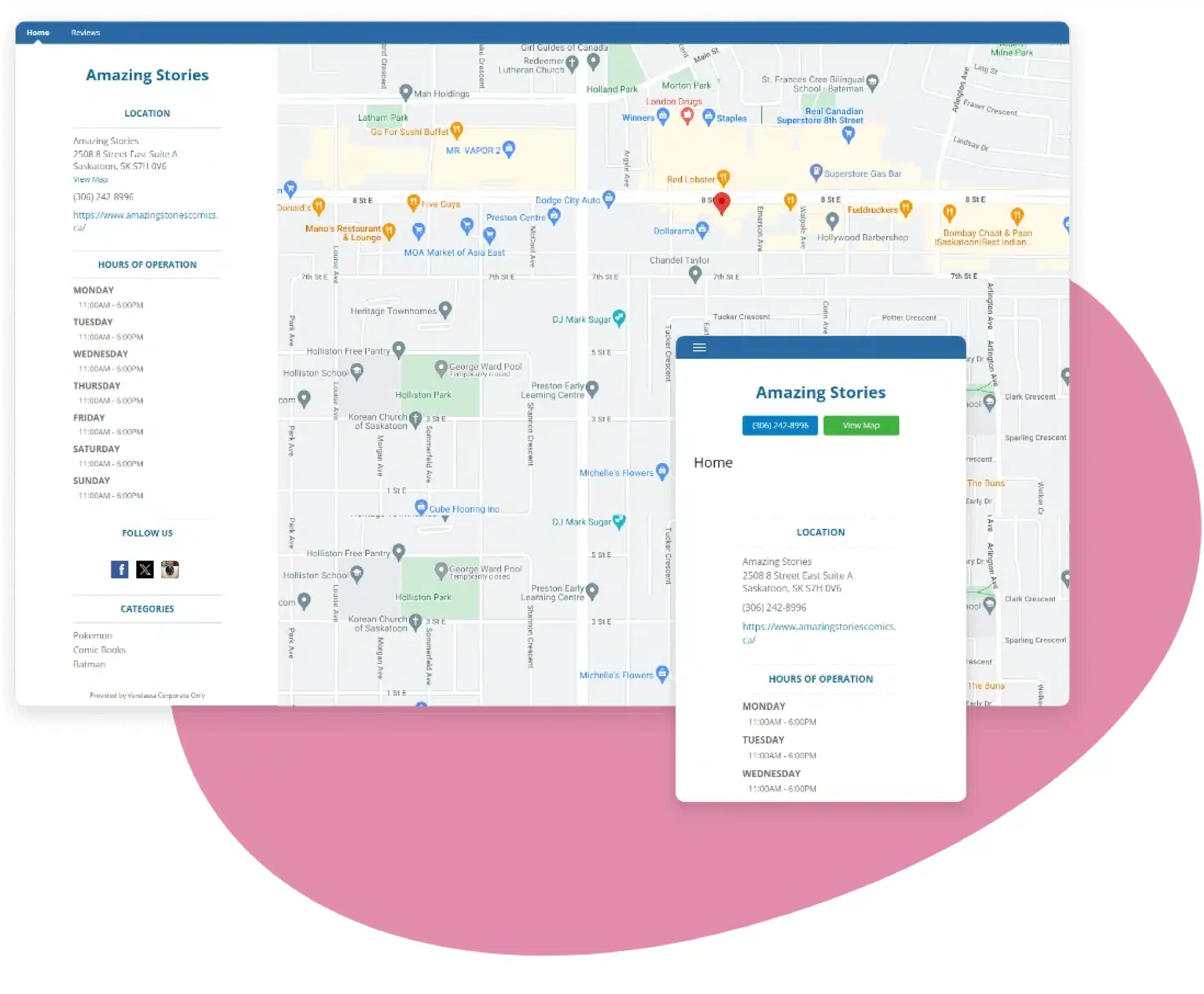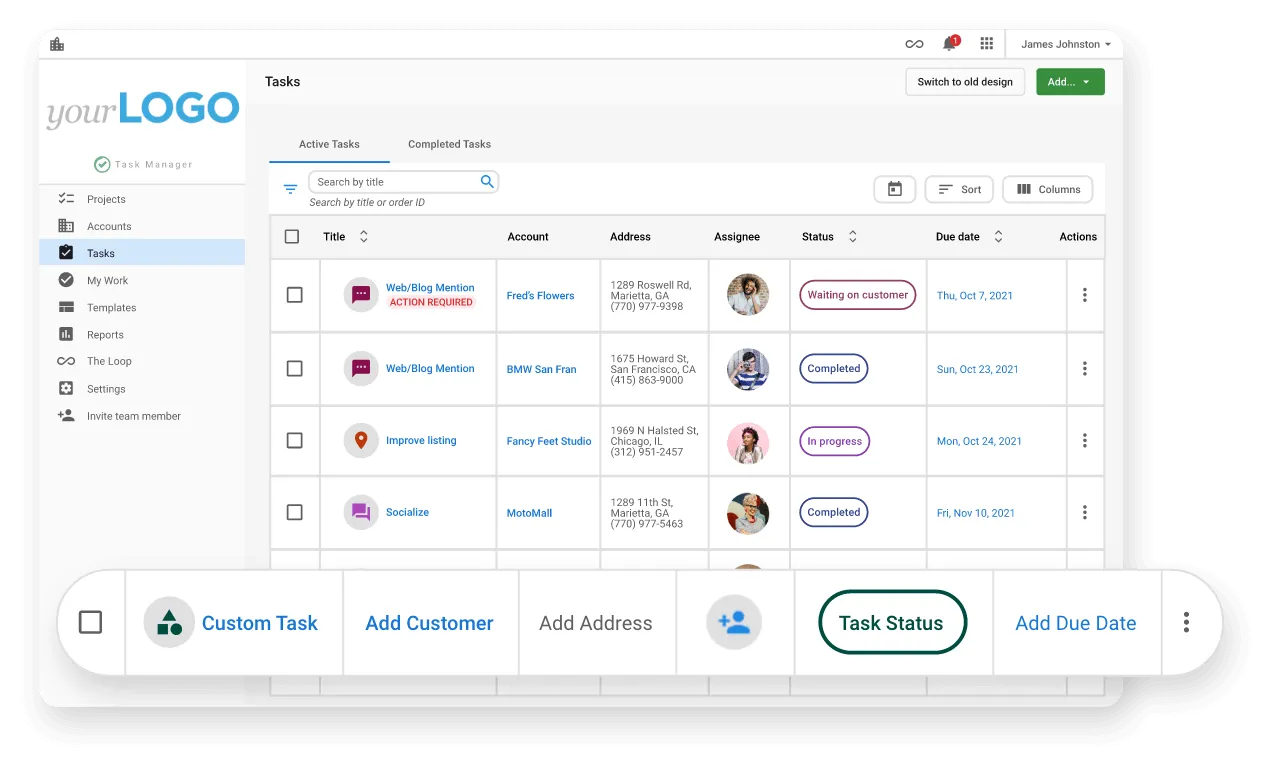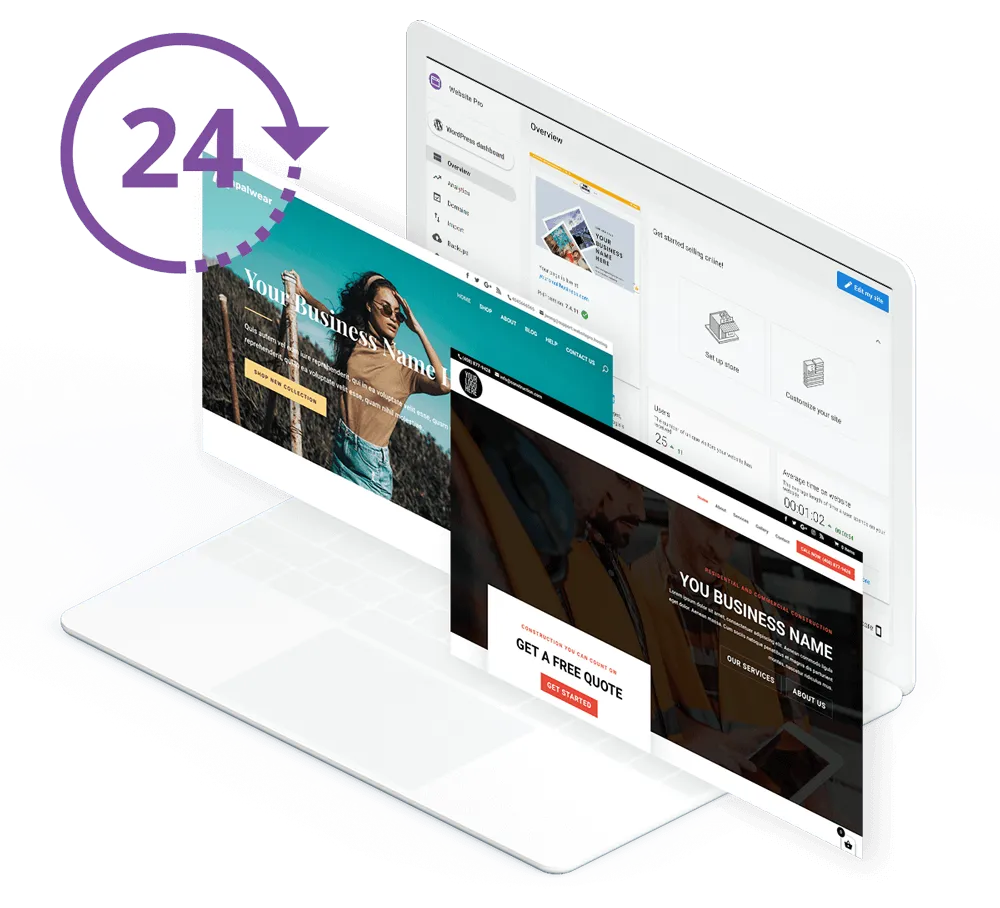Are you a start-up marketing agency deciding whether you should add white-label solutions to your product offering? A white label vs private label comparison can help make the final call.
While private labeling isn’t a common practice when it comes to start-up marketing agencies, it’s still worth knowing the difference between the two. As your agency grows, you may consider entering into partnerships with developers of marketing tools who would build tools just for your agency to offer.
In this article, we will discuss the benefits and challenges of white-label and private-label business models and share tips on how you can choose the right one for your business.
White-label 250+ products and services tailored for local businesses
What Is White Labeling?
White labeling is a business model where a developer of particular products or services sells them to a range of other companies that, in turn, brand these offerings as their own.
In digital marketing, this business model enables agencies to expand their service offerings and enhance their value proposition while focusing on their core competencies.
Examples of White-Label Business Model
SEO Services
Marketing agencies can partner with white-label SEO providers to offer comprehensive SEO services, including keyword research, content creation, on-page optimization, and link building.
By leveraging white-label SEO, agencies can deliver these services under their own brand, allowing them to attract more clients and retain existing ones without needing an in-house SEO team.
For example, Vendasta’s white-label SEO services can help your agency nail down search engine optimization for your clients.

Social Media Management
With the power of AI, it’s no longer necessary to invest in building out a social content marketing department. A white-label social media management software can handle thousands of client accounts through marketing automation.
According to the data, 75% of marketers report time savings as a key benefit of using social media automation tools.
Email Marketing
Email marketing is a powerful tool for driving customer engagement and conversions. The cost of hiring email marketing specialists may be prohibitive for a marketing agency that’s just starting.
A white-label marketing automation solution can help agencies create and launch email campaigns under their brand in no time for a wide range of clients.
According to data from Omnisend, which analyzed 17 billion emails sent through their platform, automated emails achieved significantly higher open rates, click rates, and conversion rates compared to non-automated emails. Specifically, automated emails had 84% higher open rates, 341% higher click rates, and a 2,270% increase in conversion rates.
Web Design
Building websites for clients may be costly for marketing agencies, as they need to hire web developers whose salaries are on the rise. According to Indeed, an average Web Developer salary is $80,258 annually.
White-label web design providers offer agencies the opportunity to leverage reselling white-label website solutions to expand their list of services without the need to hire designers or developers.
Benefits of White-Label Business Model
Cost-Effectiveness
White labeling allows agencies to offer a wide range of services without incurring the significant costs associated with developing and maintaining these services in-house. By outsourcing to white-label providers, agencies can reduce overhead, minimize risk, and allocate resources more efficiently.
This cost-effectiveness is particularly beneficial for small to medium-sized agencies looking to expand their offerings without stretching their budgets.
Scalability
The white-label business model is inherently scalable. As an agency’s client base grows, it can easily scale up its service offerings by leveraging its white-label partnerships. Whether the demand is for more SEO services, additional social media management, or web design projects, white-label providers can accommodate these needs without requiring the agency to hire additional staff or invest in new technology.
Access to Expertise
Partnering with white-label providers gives agencies access to broad expertise that may not be available internally. For example, an agency may need more resources to hire a team of SEO specialists, social media experts, and web developers. By working with white-label providers, agencies can tap into specialized knowledge and deliver high-quality services that meet client expectations.
Quick Market Entry
Using white label marketing tools allows agencies to enter new markets quickly by offering services they do not currently provide. For example, an agency specializing in content marketing might decide to expand into web design or email marketing. Instead of building these capabilities from scratch, the agency can partner with a white-label provider to offer these services immediately, reducing time to market and capturing new revenue streams.
Focus on Core Competencies
By outsourcing non-core services to white-label providers, agencies can deliver exceptional service in their areas of expertise while still offering a comprehensive suite of digital marketing solutions.
Challenges of White-Label Business Model
Less Innovation
One of the potential downsides of the white-label business model is that since agencies rely on third-party providers for their services, they may have limited control over the product’s customization.
This is especially detrimental in marketing, where uniqueness is the key.
Marketing agencies can mitigate this challenge by choosing to focus on a niche market. In this scenario, for example, an agency could focus on developing marketing strategies for healthcare organizations and outsource routine content production to a white-label service provider.
Dependence on Providers in Terms of Quality
Agencies that rely heavily on white-label providers may find themselves vulnerable to changes in the provider’s service quality, pricing, or availability. If a provider fails to deliver, the agency’s reputation may suffer, leading to client dissatisfaction and a potential loss of business.
Maintaining open communication and setting clear expectations with providers can help marketing agencies ensure consistent service quality.
Tip: Vendasta’s white-label Task Manager empowers both marketing agencies and their clients to keep tabs on the progress of various projects.

What Is Private Labeling?
Private labeling in digital marketing is when an agency offers marketing services or products under its own brand, even though these services or products were developed by a third-party provider.
For instance, an agency might sell a private-label SEO service that’s managed by an external provider, but it’s marketed, sold, and presented to clients as the agency’s offering.
This model allows agencies to expand their service offerings without the need to build expertise or infrastructure from scratch.
Examples of Private Label Business Model
One example of private labeling in digital marketing might be Vendasta’s offering of customizable websites on its marketplace.

Specifically, Vendasta offers marketing agencies the option to provide tailored websites to their clients, which are built according to the unique specifications of each Vendasta’s partner agency. Unlike templated websites, tailored websites can accommodate a wide range of specific design requests.
This approach is a prime example of private labeling because, although the technical work might be carried out by Vendasta or another third-party provider, the end product is fully branded as the agency’s own. The client sees the agency as the sole provider of their custom website, which strengthens the agency’s brand and client relationships.
Benefits of a Private Label Business Model
Loyalty
Private labeling fosters client loyalty because clients perceive the agency as a comprehensive solution provider. By offering a wide range of branded services, agencies can create a strong, cohesive brand identity that encourages clients to return for additional services.
High Margins
Agencies can set their own pricing for private-label services. Since the agency has more control over the final products and services, it can charge a premium price.
Exclusivity
Private-label offerings can differentiate an agency in a crowded market. By tailoring products or services to the specific needs of their target market, agencies can create exclusive offerings that are not easily replicated by competitors. This provides a competitive edge.
Challenges of a Private Label Business Model
Lack of Full Control
One of the main challenges with private labeling is a lack of full control over the final product. There is always a risk that the service may not meet client expectations. If the third-party provider fails to deliver high-quality work, it could harm the agency’s reputation.
For example, if a customizable website doesn’t fully meet a client’s specifications or is delayed, the agency must manage the client’s dissatisfaction, even though the issue might stem from the third-party provider.
To mitigate this risk, agencies should carefully vet their private-label partners and maintain close communication to ensure that the final product aligns with client expectations.
Higher Costs
Private label solutions often come with a premium price tag due to the level of customization and quality assurance involved. Established agencies, which typically have more significant resources and a steady client base, are better positioned to absorb these higher fees.
In return, they gain full control over the end product, ensuring it meets their clients’ high standards and specific requirements.
Similarities and Differences of White Label vs. Private Label
| White-Label | Private-Label | |
| Definition | Products or services are produced by a third party and sold under multiple brands. | Products or services are produced by a third party for use by a single brand. |
| Customization | Due to limited customization options, only generic products and solutions are available. | Allows for significant customization to meet specific brand needs. |
| Market Availability | Available to multiple resellers, which leads to a broader market presence. | Exclusive to one reseller, which provides a unique market offering. |
| Cost and Investment | Generally less expensive due to economies of scale and shared production costs. | Typically more expensive due to customization and exclusivity. |
| Brand Ownership | Due to limited customization options, less tailored to the resellers’ brands. | Due to a wider range of customization options, allow resellers to have more control over branding. |
| Time to Market | Faster time to market with ready-made solutions. | Longer time to market due to customization and development. |
| Examples | SEO services, social media management, email marketing, and web design | Custom digital solutions and specialized marketing tools, including SEO services, social media management, email marketing, and web design. |
| Quality Control | There is less control over quality for the reseller marketing agency. | More control over quality as reseller marketing agencies work closely with the providers of private label solutions. |
Opportunities for Reseller Marketing Agencies
White Label Business: Opportunities for Reseller Marketing Agencies
White-label solutions are generally more cost-effective than private-label alternatives. Start-up agencies, which may not yet have the financial resources to invest in highly customized services, can benefit from the lower fees associated with white-label business opportunities.
This cost efficiency allows them to offer a range of services without a substantial upfront investment, enabling quicker market entry and growth.
Another opportunity for marketing agencies is to opt for a white-label affiliate program. In this framework, your marketing agency could resell a white-label platform to those who can use it to sell white-label products or services to their end clients.
Let’s take a look at an imaginary scenario when your agency becomes Vendasta’s affiliate. If that were the case, you would receive a unique affiliate link to market Vendasta’s white-label platform to agencies that might be interested in leveraging Vendasta’s white-label tools to expand their marketing services.
Whenever a marketing agency converts, you earn a commission.
Private Label Business: Opportunities for Reseller Marketing Agencies
Established agencies with the financial capacity to invest in premium, customized solutions will benefit from the exclusivity and control offered by private labeling.
Things to Consider When Choosing White-Label vs. Private-Label Business Models
Let’s go through key considerations to help you make an informed decision.
Time-Efficiency
If your primary goal is to get to market quickly, the white-label model is a strong contender. White-label solutions are pre-developed products that your agency can brand as its own. This means you can start offering new services almost immediately, without the lengthy process of product development.
While private-label products offer customization, they typically require more time to develop. You’ll need to work closely with the provider to tailor the product to your brand’s specifications. While this process results in a unique offering that stands out from competitors, it can delay market entry.
Cost-Effectiveness
White-label solutions are generally more cost-effective. They allow agencies to offer a wide range of services without significant upfront investment in product development. This model is ideal for agencies looking to expand their offerings while keeping costs low.
Private-label products often come with higher costs due to the customization involved. However, this investment can pay off in the long run by allowing you to charge premium prices.
Focus on Core Competencies
One of the key benefits of white labeling is that it allows you to focus on what you do best—whether it’s client management, strategy, or sales. By outsourcing product development to a third party, your agency can streamline operations and focus on delivering exceptional service.
While private-labeling also allows for outsourcing, the need for customization means you’ll likely need to invest more time in product development. This can divert attention from your core competencies.
Expand Your Service Portfolio
White-labeling is an excellent way to quickly and affordably expand your service portfolio through the best white-label reseller programs. By partnering with a white-label provider, you can offer additional services such as SEO, social media management, white-label apps, or email marketing without needing to develop these capabilities in-house.
Private-labeling also enables portfolio expansion but allows for a more tailored approach. If your clients demand highly customized solutions, private labeling offers the flexibility to meet those needs while still expanding your offerings.
Scalability
White-label solutions are highly scalable. As your agency grows, you can easily add new services by leveraging the provider’s existing infrastructure. This makes white-labeling an excellent choice for agencies looking to scale quickly.
Private-label products can also be scalable, but growth may be slower due to the time and resources required for customization. However, once established, private-label products can offer a strong competitive edge, especially in niche markets.
Bolster Your Brand
White-labeling allows you to build your brand by offering a wide range of services under your name. However, the downside is that since these products are available to other agencies as well, it may be harder to differentiate your brand.
Private labeling is a powerful tool for brand building. Because the products are customized to your specifications, they reflect your brand’s unique identity and values, helping you stand out in a crowded marketplace.
White Label at Vendasta
Vendasta offers a range of white-label and private-label marketing services tailored to digital marketing agencies. With a focus on efficiency, scalability, and cost-effectiveness, Vendasta’s white-label platform and marketing services allow you to quickly expand your service portfolio while maintaining your brand identity.
Vendasta was built with a reseller focus and has lots of helpful resources, including the ultimate guide to white label. Whether you are an entrepreneur or an established B2B seller, Vendasta has a pricing tier built to suit your unique needs.
FAQs
1. What does white label vs private label mean for agencies.
White label means reselling ready-made services or software under your brand, shared with many resellers. Private label means a provider builds or customizes for your brand alone, offering exclusivity. The trade-off is speed and cost with white label versus control and differentiation with private label.
2. What is the main difference between white label and private label in marketing.
White label solutions are standardized, fast to launch, and cost-effective, but less customizable. Private label solutions are tailored to your specifications, support unique positioning, and often command higher margins, but require longer lead times, closer collaboration, and higher upfront investment.
3. Which is better for a startup agency, white label or private label.
Most startups choose white label to get to market quickly, validate demand, and conserve budget. After establishing revenue and processes, you can layer private label offerings for differentiation in niches where customization, proprietary features, or exclusive packages materially improve win rates and retention.
4. How do costs compare in white label vs private label programs.
White label typically has lower platform fees and shared development costs, making unit economics predictable. Private label often involves scoping, setup, and customization fees, plus higher ongoing costs. The upside is premium pricing power and brand exclusivity that can offset investment once you reach scale.
5. How does time to market differ between white label and private label.
White label launches in days or weeks using existing templates, fulfillment, and integrations. Private label requires discovery, design, build, and QA cycles, stretching timelines to weeks or months. Choose based on urgency, budget, and whether differentiation now outweighs the opportunity cost of waiting.
6. Can I mix white label and private label in one service portfolio.
Yes. Many agencies run a hybrid model. Use white label for standardized services like listings, reviews, and basic SEO, then add private label for premium tiers, niche workflows, or exclusive dashboards. This balances speed, margin, and differentiation across client segments and budgets.
7. How does branding control compare between white label and private label.
White label lets you rebrand interfaces, reports, and domains but within predefined limits. Private label expands control to feature sets, data views, and UX, enabling unique offers and messaging. Greater control also means greater responsibility for maintenance, roadmap input, and change management.
8. How does Vendasta support white label vs private label strategies.
Vendasta provides a white-label platform with marketplaces, fulfillment, and client dashboards to launch quickly and scale. Agencies can also package bespoke services, workflows, and branded assets for private-label-like experiences, unifying reporting and invoicing while maintaining your brand at every client touchpoint.
9. What factors should I consider when choosing white label vs private label.
Assess goals, budget, timeline, in-house expertise, required differentiation, and client expectations. Map total cost of ownership, including support and iteration. Start where risk is lowest and impact is highest, then evolve toward private label where customization clearly drives conversion, retention, or premium pricing.
10. Do white label vs private label choices affect scalability and support.
White label scales fastest with shared infrastructure, standardized SLAs, and turnkey fulfillment. Private label scales when you have defined processes, predictable demand, and resources for ongoing updates and support. Many agencies scale on white label first, then selectively privatize high-value offerings.
This article was originally published in June 2023 and was updated in August 2024 to include the latest information and insights.


